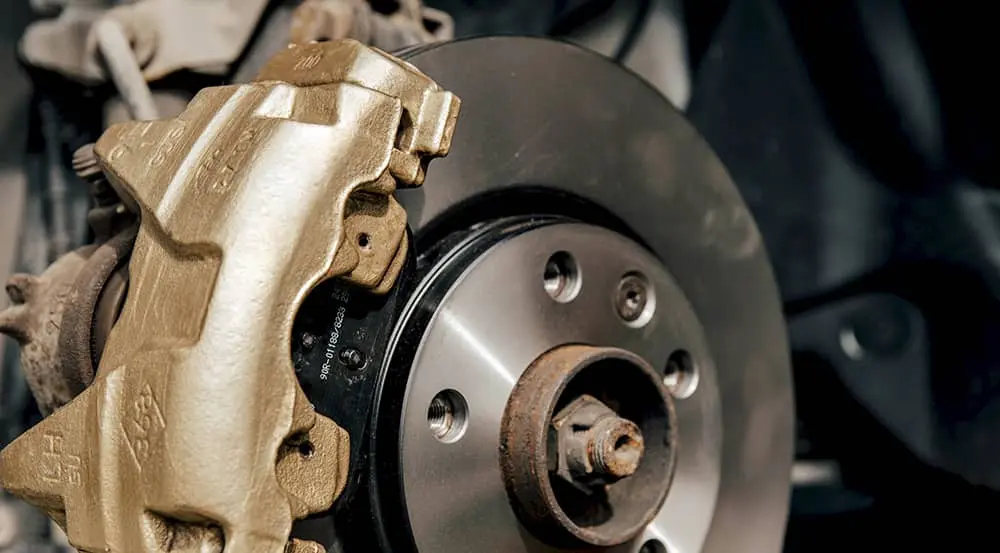Your car’s braking system is one of its most crucial safety features. Recognizing the signs that your brake components are wearing out can mean the difference between a smooth, safe ride and potential accidents. Worn brakes not only compromise your car’s stopping power but can also lead to costly repairs if not addressed promptly. In this post, we’ll explore the top five signs indicating it’s time to replace your brake pads.
1. Squeaking or Squealing Noise
One of the earliest and most common signs of worn-out brakes is a high-pitched squealing or screeching sound when you apply the brakes. This noise occurs because the wear indicator, a small metal piece embedded in the brake material, makes contact with the rotor. This design serves as a warning that the brake material is getting too thin. If they have gone past their limit, you may hear and/or feel a grinding noise. Ignoring this sound can result in further damage, making the issue more severe. Additionally, they may not feel as effective as they once were.
2. Grinding Sound
If you hear a grinding noise when pressing the brake pedal, it’s a sign that the brake material is severely worn and needs immediate replacement. This sound happens when the brake material is entirely worn down, causing the caliper’s metal to grind against the rotor. The resulting metal-on-metal friction can cause significant damage to the rotors, leading to expensive repairs. At this stage, you’ll likely need to replace both the brake components and possibly the rotors.
Consider what could happen if these warning signs are ignored. Take, for example, a driver who notices the squealing noise but continues to drive without seeking maintenance. Over time, this squeal turns into a grinding noise as the brake material wears down completely. A customer once came in after ignoring a grinding sound, and the delay ended up costing them new rotors and calipers.
3. Brake Pulsation / Vibration When Braking
Another indication that it might be time to replace your brakes is a vibration or pulsation in the brake pedal when you apply the brakes. This typically occurs as you press the brakes from a higher speed. This will result in the brake pedal moving up and down under your foot or it may cause the steering wheel to wobble back and forth. This could mean that the brake material is unevenly worn or that the rotors have become warped. Warped rotors can occur due to uneven wear, leading to an inconsistent braking surface. If you experience this issue, it’s essential to have your brakes inspected by a professional mechanic to determine whether you need new brake pads or if the rotors need to be resurfaced.
4. Longer Stopping Distance
Have you noticed that your vehicle is taking longer to come to a complete stop? This is a serious sign that your brake system is no longer performing as it should. As the brake components wear down, their ability to generate friction diminishes, resulting in longer stopping distances. This can be especially dangerous in emergencies where quick stops are necessary. If you encounter this issue, it’s crucial to replace your brake components as soon as possible to ensure safety on the road. To make sure you maintain all of your braking capabilities, you should see a brake mechanic as soon as possible for a thorough grasp of what’s wrong with your brakes.
5. Brake Pad Indicator Light
Many modern vehicles have a brake wear indicator light on the dashboard. This light alerts you when your brake components are nearing the end of their lifespan. If this light comes on, it’s a clear sign that you need to have your brakes inspected and possibly replaced. While it might be tempting to ignore the light if you’re not experiencing any other symptoms, it’s essential to take this warning seriously. Replacing your brakes promptly will help you avoid more extensive damage to your braking system.
Maintaining the performance and safety of your car depends on knowing when to replace the brake pads. These warning signals, which can include a longer stopping distance, a grinding noise, or the characteristic squeaking sound, should never be disregarded. In addition to saving money on repairs, routine brake inspections and prompt replacements can keep you safe while driving. If you’re noticing any signs that your brake pads need replacement, don’t wait—schedule an appointment with us for expert brake replacement and repair.
Ignoring the Warning Signs: A Cautionary Tale
Consider what could happen if these warning signs are ignored. Take, for example, a driver who notices the squealing noise but continues to drive without seeking maintenance. Over time, this squeal turns into a grinding noise as the brake material wears down completely. The driver, caught in rush-hour traffic, attempts to stop quickly but notices that the car isn’t slowing down as it should. The once preventable issue now causes an accident, not only leading to extensive damage to the car but also risking serious injury. This scenario highlights the importance of addressing brake issues early to avoid potentially disastrous outcomes.
Recognizing when it’s time to replace your brake rotors is vital for maintaining your vehicle’s performance and safety. Never ignore these warning signals, whether it’s a longer stopping distance, a grinding noise, or the telltale squeaking sound. Regular inspections and timely replacements will not only save you money on repairs but also keep you safe on the road. Let our skilled technicians keep your vehicle running safely and smoothly. Contact us now to book your service!
Frequently Asked Questions (FAQs)
Q: How often should I replace my brake pads?
A: Brake pads typically need to be replaced every 30,000 to 70,000 miles, depending on driving habits, the type of vehicle, and the quality of the brake pads. Regular inspections can help determine the exact timing for your specific situation.
Q: What are the warning signs that my brake pads need replacement?
A: Common warning signs include squeaking or squealing noises, a grinding sound, a vibrating brake pedal, longer stopping distances, and a brake pad indicator light on your dashboard.
Q: Can I still drive with worn brakes?
A: It’s not recommended to drive with worn brake pads. Doing so can compromise your vehicle’s braking ability, increase stopping distances, and potentially cause damage to other parts of the brake system, leading to more expensive repairs.
Q: How much does it cost to replace brake rotors?
A: The cost of brake pad replacement varies depending on the type of vehicle, the quality of the brake pads, and the labor involved. On average, you can expect to pay between $150 and $300 per axle.
Q: What happens if I ignore the signs of worn brake pads?
A: Ignoring worn brake pads can lead to serious issues, including damaged rotors, increased stopping distances, and a higher risk of accidents. Over time, the repair costs will also increase as more components of the braking system are affected.
Q: Can I replace my brake pads myself, or should I see a professional?
A: While it’s possible to replace your brakes yourself if you have the right tools and experience, it’s generally safer and more reliable to have a professional mechanic handle the job. They can ensure that the brake system is properly inspected and that all components are in good working condition.


